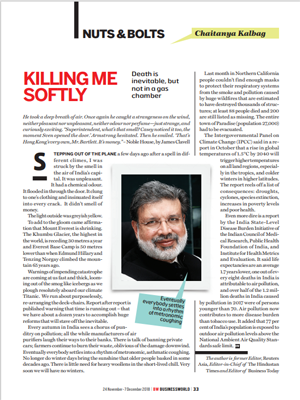KILLING ME SOFTLY
[Business World]
Published date: 24 Nov 2018
He took a deep breath of air. Once again he caught a strangeness on the wind, neither pleasant nor unpleasant, neither odour nor perfume—just strange, and curiously exciting. “Superintendent, what’s that smell? Casey noticed it too, the moment Sven opened the door.’ Armstrong hesitated. Then he smiled. ‘That’s Hong Kong’s very own, Mr. Bartlett. It’s money.”– Noble House, by James Clavell
Stepping out of the plane a few days ago after a spell in different climes, I was struck by the smell in the air of India’s capital. It was unpleasant. It had a chemical odour. It flooded in through the door. It clung to one’s clothing and insinuated itself into every crack. It didn’t smell of money.
The light outside was greyish yellow. To add to the gloom came affirmation that Mount Everest is shrinking. The Khumbu Glacier, the highest in the world, is receding 30 metres a year and Everest Base Camp is 50 metres lower than when Edmund Hillary and Tenzing Norgay climbed the mountain 65 years ago.
Warnings of impending catastrophe are coming at us fast and thick, looming out of the smog like icebergs as we plough resolutely aboard our climate Titanic. We run about purposelessly, Titanic. We run about purposelessly, reforms that will stave off the inevitable.
Every autumn in India sees a chorus of punditry on pollution; all the while manufacturers of air purifiers laugh their ways to their banks. There is talk of banning private cars; farmers continue to burn their waste, oblivious of the damage downwind. Eventually everybody settles into a rhythm of metronomic, asthmatic coughing. No longer do winter days bring the sunshine that older people basked in some decades ago. There is little need for heavy woollens in the short-lived chill. Very soon we will have no winters.
Last month in Northern California people couldn’t find enough masks to protect their respiratory systems from the smoke and pollution caused by huge wildfires that are estimated to have destroyed thousands of structures; at least 88 people died and 200 are still listed as missing. The entire town of Paradise (population 27,000) had to be evacuated.
The Intergovernmental Panel on Climate Change (IPCC) said in a report in October that a rise in global temperatures of 1.5°C by 2040 will trigger higher temperatures on all land regions, especially in the tropics, and colder winters in higher latitudes. The report reels off a list of consequences: droughts, cyclones, species extinction, increases in poverty levels and poor health.
Even more dire is a report by the India State-Level Disease Burden Initiative of the Indian Council of Medical Research, Public Health Foundation of India, and Institute for Health Metrics and Evaluation. It said life expectancies are an average 1.7 years lower, one out of every eight deaths in India is attributable to air pollution, and over half of the 1.2 million deaths in India caused by pollution in 2017 were of persons younger than 70. Air pollution now contributes to more disease burden than tobacco use. It added that 77 per cent of India’s population is exposed to outdoor air pollution levels above the National Ambient Air Quality Standards safe limit.






